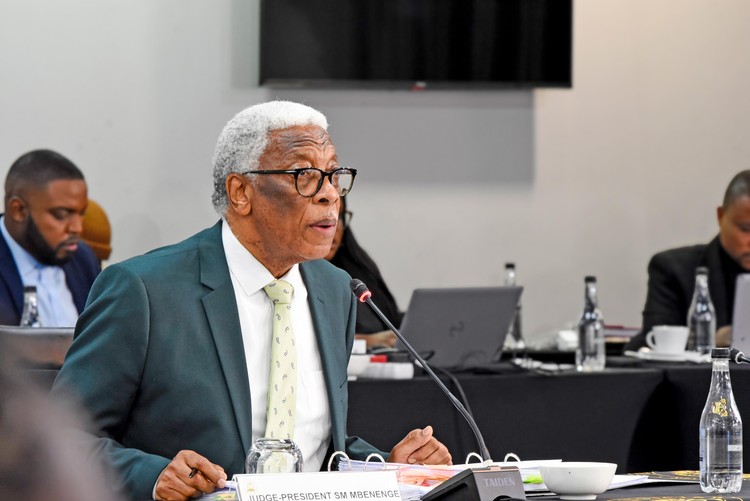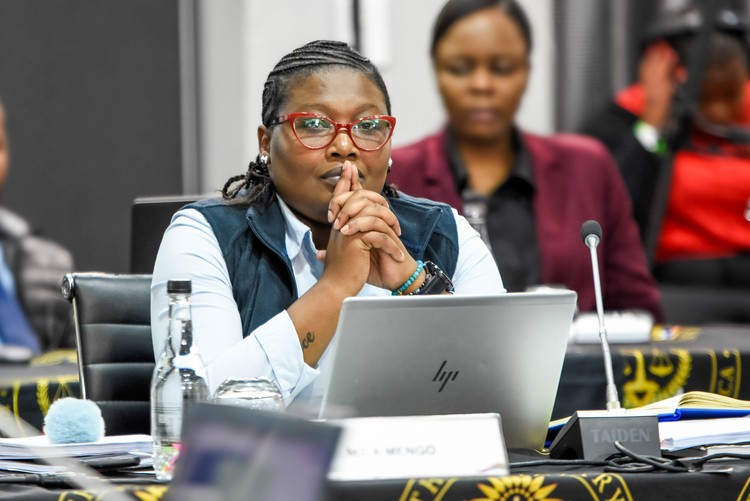Closing arguments in Judge Mbenenge sexual harassment tribunal
Lawyer says this case will likely determine whether other women with legitimate claims will come forward, but tribunal chair disagrees
Eastern Cape Judge President Selby Mbenenge. Archive photo: Office of the Chief Justice
It was not open to Eastern Cape Judge President Selby Mbenenge to claim his persistent sexually loaded WhatsApp messages to court secretary Andiswa Mengo were Xhosa “cultural courting”. This was because the evidence clearly showed that it was sexual harassment, Mengo’s advocate argued on Tuesday.
Advocate Nasreen Rajab-Budlender said if the tribunal, which is considering Mengo’s complaint, found in Mbenenge’s favour regarding this “cultural practice”, the logical conclusion was that it was permissible to badger a woman, and refuse to take “no” for an answer, until she finally relented.
“That is the very definition of sexual harassment,” she said.
The tribunal, chaired by retired Judge Bernard Ngoepe, heard closing arguments in the matter in which Mengo accuses Mbenenge of sending her multiple WhatsApp messages between 2021 and 2022. Some contained “sexually explicit” emojis of bananas and eggplants. Others asked her for naked pictures and if they could be intimate.
Mbenenge has conceded that he sent the messages, which were retrieved from Mengo’s cellphone, but claims the relationship was consensual. He denies sending her a picture of his penis or that he asked her for oral sex in his Mthatha chambers.
Court secretary Andiswa Mengo has accused Eastern Cape Judge President Selby Mbenenge of sexual harassment. Archive photo: Office of the Chief Justice
Mengo, however, says his advances were totally unwanted. During her ten days of testimony and cross-examination, she said she was shocked and confused at his advances, and frightened of the consequences if she outrightly rebuffed him.
Explaining her flirtatious, playful emojis and responses, she said she had attempted to distract him and humour him. But, Rajab-Budlender submitted on Tuesday, the record showed that she had said “no” or indicated such at least 13 times.
Rajab-Budlender said the case, the first in which a judge was facing charges of sexual harassment, would “likely determine whether other women with legitimate claims will come forward”.
Ngoepe challenged this: “You can’t say that. Each case is adjudicated according to its own facts. We will determine it according to the law and the facts before us.”
But Rajab-Budlender persisted.
“We can’t pretend that when we make findings about how women are required to behave and whether there is perceived consent, that it won’t have an effect on other women.”
“This case is important. We cannot pretend that it’s just about these two people. It is not.”
She questioned whether the conversations Mbenenge admitted having with a junior secretary were in line with the judicial code of conduct, “and what we and the public expect of our judiciary”.
“What is at issue here is his conduct. Not her conduct. It doesn’t matter how she responded. There is no such thing as a perfect victim.”
Rajab-Budlender said Mbenenge’s admitted conduct would be a dismissible offence in any workplace.
Regarding submissions by Mbenenge’s legal team that there was nothing wrong with a judge having a relationship with a secretary, per se, she argued that this was not an “open relationship” but one which Mbenenge had concealed, through the deletion of his messages, his instruction to Mengo to delete hers and his fears that his wife would find out.
His actions were not in line with the Judicial Code of Conduct or the recently approved sexual harassment code for the judiciary, which stated that judges had to act honourably at all times, even in private.
Judge Ngoepe questioned both Rajab-Budlender and evidence leader Adv Salome Scheepers whether the WhatsApp messages “objectively”, through the eyes of the average person, showed that Mengo had made her feelings known.
Both pointed to the evidence of gender based violence expert Dr Lisa Vetten, who testified about power dynamics and that Mbenenge had “exploited” this.
But later Ngoepe said he was concerned with Vetten’s evidence that women did not have power at all, citing examples from the messages which, he said, indicated that at times Mengo had exerted her womanly powers - the “keys to her heart”.
Rajab-Budlender said this was not an ordinary relationship but a workplace relationship.
She said Vetten’s evidence had to be seen in that context.
On several occasions during argument, Ngoepe questioned whether, objectively, Mbenenge’s advances could be viewed as unwanted in light of the WhatsApp exchanges.
But both Scheepers and Rajab-Budlender said the evidence was clear and that the tribunal should find Mbenenge guilty of gross misconduct.
Advocate Muzi Sikhakhane, for Mbenenge, said his client was innocent and should be found to be so.
“A lot of moral questions have been raised by high-horse riders. This was flirting and does not constitute sexual harassment,” he submitted.
He said the allegation that Mbenenge sent Mengo a picture of his penis was a “very painful public lie”, as was the alleged incident in his chambers.
“There is no evidence of this,” he said.
“You are not required to determine how flirting should be done. Whether he does it elegantly or inelegantly. The narrow complaint is based on WhatsApp messages. In order for it to constitute sexual harassment, it must be unwanted, persistent, humiliating, or threatening adverse consequences.
“Who initiates it is not a factor regarding consent.”
Sikhakhane said to suggest that Mbenenge should have bought Mengo flowers or taken her out was “condescending”.
The test, he said, was not subjective but objective, and on the evidence, there was no indication of any rebuff.
“Nobody must be sexually harassed, but no one must be falsely accused and lose their job because of it.”
Rajab-Budlender, in reply, said it was open to the tribunal to find Mbenenge guilty of only misconduct and then leave it in the hands of the Judicial Service Commission.
Ngoepe had the last word: “We will not be swayed by public opinion, one way or another. We will decide it based on the facts and the law. We will adjourn and give ourselves time to consider the matter.”
Support independent journalism
Donate using Payfast

Don't miss out on the latest news
We respect your privacy, and promise we won't spam you.
© 2025 GroundUp. This article is licensed under a Creative Commons Attribution-NoDerivatives 4.0 International License.
You may republish this article, so long as you credit the authors and GroundUp, and do not change the text. Please include a link back to the original article.
We put an invisible pixel in the article so that we can count traffic to republishers. All analytics tools are solely on our servers. We do not give our logs to any third party. Logs are deleted after two weeks. We do not use any IP address identifying information except to count regional traffic. We are solely interested in counting hits, not tracking users. If you republish, please do not delete the invisible pixel.


